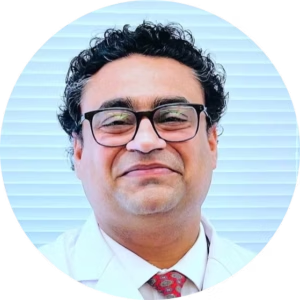
We are delighted to welcome Dr Sonu Bhaskar, MD, PhD, FANA, as a touchNEUROLOGY Future Leader 2025. Already an internationally renowned neurologist and physician-scientist, Dr Bhaskar is a leading figure in vascular neurology and neuroradiology.
As Founding Director of the Global Health Neurology Lab and the pioneering NSW Brain Clot Bank in Sydney, Australia, Dr Bhaskar heads a multidisciplinary team driving innovation in stroke care and global health research. He is currently serving as Visiting Director at the National Cerebral and Cardiovascular Centre (NCVC) in Osaka, Japan (2023–25), where his work continues to influence healthcare policy across the Asia-Pacific and beyond.
In recognition of his outstanding contributions, Dr Bhaskar has received numerous accolades, including most recently the prestigious JSPS International Fellowship. In this Q&A, he shares insights into his career journey, research motivations and vision for the future of neurology.
My journey in neurology is deeply personal. I still remember the profound impact of losing my maternal grandfather to sepsis following a cardiac bypass—a loss that underscored the fragility of life and the urgent need for compassionate care. Additionally, during a humanitarian medical camp in an under-resourced region, I witnessed first-hand the real-world challenges faced by patients and communities. I was further intrigued to investigate the etiological origins of a cryptogenic stroke in a patient for whom, despite the best diagnostic work-up, the cause remained elusive. This curiosity drove me to delve into histopathological analyses of brain clots, eventually inspiring the foundation of the brain clot bank. Finally, I have drawn immense inspiration from the lives and struggles of Santiago Ramón y Cajal, Rabindranath Tagore and Albert Einstein, whose legacies remind me that every challenge is an opportunity for transformative innovation.
I am deeply inspired by the transformative potential of artificial intelligence and neuroinformatics in diagnosing and guiding the management of neurological disorders. Watching AI evolve from a promising concept to a tool that enables early detection and personalized treatment has been exhilarating. This fusion of technology and medicine is not merely a scientific breakthrough—it’s a revolution redefining patient care and extending critical services to underserved communities. It motivates me daily to push boundaries and harness innovation in ways that make a real, human difference.
My mission is to educate and empower the next generation of physicians, neurologists and researchers—reminding them that, regardless of where they come from, they have the power to make a difference in people’s lives. I am spearheading an initiative with equity at its heart to ensure that the best of medical treatments and innovations reach under-resourced settings and underserved populations. As I continue to strive for a more inclusive healthcare landscape, I hold dear the belief that “The best way to find yourself is to lose yourself in the service of others (Gandhi).” I also reflect on the Japanese philosophy of “ichi go, ichi iie” by Kobo Daishi, a reminder that every encounter is unique and precious. When anchored in service, life finds deeper meaning, joy becomes shared and purpose extends beyond oneself.
Disclosures: No funding was received in the publication of this article. Dr Sonu Bhaskar has nothing to disclose in relation to this article.
Cite: Leading the way in vascular neurology with Sonu Bhaskar: touchNEUROLOGY Future Leader 2025. touchNEUROLOGY. 1 July 2025.
Register now to receive the touchNEUROLOGY newsletter!
Don’t miss out on hearing about our latest peer reviewed articles, expert opinions, conference news, podcasts and more.



